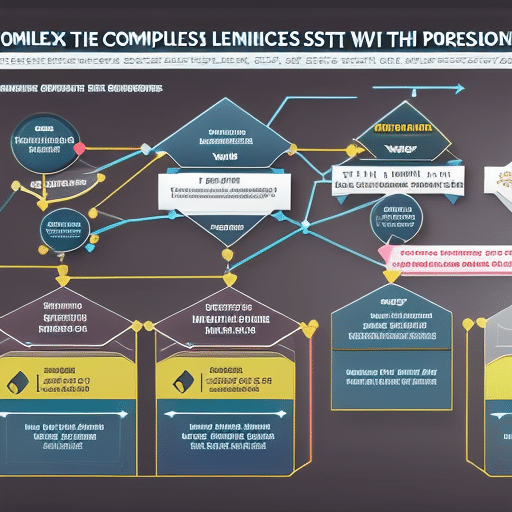With the rise of cryptocurrency in recent years, crypto gaming sites have become increasingly popular for both players and operators alike. As a result, many jurisdictions have stepped up their efforts to regulate the industry with licensing requirements. This article will provide an overview of the licensing process for crypto gaming sites, looking at the regulatory landscape, responsible gambling measures, data protection and privacy, player dispute resolution, technical standards and requirements as well as ongoing monitoring and compliance.
Table of Contents
ToggleOverview of Crypto Gaming Sites
Crypto gaming sites are the hot new way to play, offering gamers a chance to experience all the classic titles they know and love while taking advantage of cryptocurrency’s unique features. Crypto mining and blockchain technology have opened up a world of possibilities for gaming enthusiasts, allowing them to earn money through their favorite pastime. These opportunities come with both risks and rewards; obtaining a license is the best way to protect yourself and ensure that your gaming site operates within legal parameters. Moreover, having a license can unlock numerous benefits which could help you take your crypto gaming site to the next level.
Benefits of Obtaining a License
By obtaining a license, you can reap numerous advantages that will strengthen your operations. Having a valid license for crypto gaming sites can provide financial and tax benefits. This helps to create a reliable foundation for both players and operators, as the regulations implemented by the licensing authority ensure fairness in the games offered and protect users’ funds through a secure environment. Furthermore, with a legitimate license, you can prove to customers that your business is trustworthy and reliable.
In addition, there are also potential tax implications associated with acquiring a license which may help to reduce overall costs of operation. Obtaining such legal approval also allows access to different payment methods, which provides more convenient options for customers to make deposits or withdraw winnings from their accounts. As such, having an official gaming license demonstrates your commitment to operating responsibly within the industry and providing the highest quality service possible – something that prospective players look for when selecting where they want to play online games. All these advantages show why it is important to obtain a proper licence before launching any sort of crypto gaming platform. Taking this step ensures that these sites are compliant with all applicable laws and regulations set out by regulatory authorities; thus enabling smoother running operations in the long run. With this knowledge in mind, we now move onto looking at an overview of the licensing process for crypto gaming sites
Licensing Process Overview
Getting your crypto gaming business licensed is essential for ensuring the success of your operations. The licensing process typically involves understanding the regulatory landscape and taxation implications, familiarizing yourself with the latest gaming trends, submitting a complete application package, and finally undergoing an in-depth evaluation from the licensing authority. It’s important to note that you may have to obtain multiple licenses depending on where you’re operating. Additionally, many jurisdictions require that you keep up with any changes in their regulations so that you remain compliant. Having a clear grasp of all these elements makes transitioning into the next section about the regulatory landscape for crypto gaming sites much smoother.
Regulatory Landscape for Crypto Gaming Sites
When it comes to running a successful crypto gaming site, understanding the regulatory landscape is essential. Different types of licenses are required depending on the type of gambling activities you are offering, and each jurisdiction has its own set of requirements that must be met in order to obtain a license. Additionally, certain gambling authorities will need to be satisfied as part of the licensing process. Understanding which jurisdictions your website needs to be licensed in can help ensure compliance with all relevant regulations.
Different Types of Licenses
You’re probably wondering what types of licenses are needed to run a crypto gaming site. Depending on the jurisdiction, businesses that offer digital currency services may need to obtain different types of licenses in order to be legally compliant with taxation laws. Additionally, there may also be specific gambling authority requirements in certain countries or regions that have their own sets of regulations which must be met prior to conducting any type of transactions involving digital currencies. To ensure compliance with these laws and regulations, it is important for crypto gaming sites to acquire adequate licensing before launching their operations. By doing so, they can protect themselves from legal risks as well as build trust with customers when handling financial transactions.
Moving forward, it’s important for crypto gaming sites to understand the local regulations concerning online gambling and other activities related to digital currencies. This will help them determine which type of license they need in order to operate their business legally and safely.
Gambling Authority Requirements
Navigating the gambling authority requirements of different countries and regions can be a tricky process, so it’s important for crypto gaming sites to stay up-to-date on the latest laws in order to ensure compliance with regulations and avoid any unwanted surprises. Gaming taxes vary from jurisdiction to jurisdiction, so it is essential that operators understand how they will be taxed and pay them accordingly. Similarly, payment security is a top priority when managing online transactions as you need to guarantee that all payments are safe and secure for both gamers and operators. In addition, many jurisdictions require customer authentication protocols such as KYC (Know Your Customer) or AML (Anti Money Laundering) processes. To keep up with these regulations, gaming sites must invest in the necessary resources to remain compliant with all applicable rules. With these considerations in mind, crypto gaming sites must take into account licensing jurisdictions in order to continue operating legally.
Licensing Jurisdictions
Choosing the right licensing jurisdiction for your online gaming can be a critical decision that could make or break your business. It’s important to consider the game legality, license fees, and other associated costs of each jurisdiction before making a final decision. Here are 4 reasons why you should pick the right licensing jurisdiction:
- Security: Governments in different countries have varying levels of regulations when it comes to crypto gaming sites, and picking one with strong security measures will ensure that your customers remain safe while using your platform.
- Reputation: Operating in a reputable licensing jurisdiction can help bolster your reputation and credibility as an online gaming operator.
- Affordability: Different jurisdictions often have varying levels of license fees and associated costs, so it is important to compare them to find one that fits within your budget.
- Compliance: By operating in an approved jurisdiction, you’ll be more likely to comply with local laws and regulations which can help avoid potential legal issues down the road.
The responsible gambling measures taken by each licensing jurisdiction will also need to be considered in order to ensure customer safety – something that should always be prioritized over profits when running any online gaming site.
Responsible Gambling Measures
Ensuring responsible gambling measures are in place is essential for any crypto gaming site, but it can be difficult to implement. Still, with the right commitment and policies, you can make sure players enjoy a safe gambling experience. Consumer protection and youth safeguarding should both be priorities when implementing these measures, especially to ensure that minors do not have access to online casino games or any other forms of online gambling. Moreover, all players should receive clear information regarding their rights as consumers and what they can do if they encounter a problem while playing on the crypto gaming site. To guarantee these measures are met effectively and efficiently, operators must establish firm internal procedures and training programs that will ensure employees understand the importance of responsible gambling practices.
By taking such steps, operators can ensure that their customers feel secure when playing at their crypto gaming site. This will also help set up a strong foundation from which anti-fraud and anti-money laundering measures can then be implemented.
Anti-Fraud and Anti-Money Laundering Measures
Implementing anti-fraud and anti-money laundering measures can help create a safe and secure experience for everyone involved in crypto gaming. Cryptocurrency security is an essential part of the licensing process, as it helps to protect players from any malicious activities. This includes preventing identity theft, credit card fraud, and other financial scams that could be perpetrated with digital currencies. To ensure maximum security, licensed crypto gaming sites must adhere to strict regulatory standards, including implementing modern encryption protocols and robust authentication procedures. Additionally, financial transparency should be maintained throughout the entire process to provide complete clarity on how funds are used and distributed. By taking these proactive steps, operators can ensure that their customers’ data remains secure at all times. To further guarantee the safety of all participants, stringent anti-fraud and anti-money laundering measures should be put into place within a crypto gambling platform. As such, moving forward with data protection and privacy will help solidify the trust between a gaming site operator and its users.
Data Protection and Privacy
Securing your data and protecting your privacy is essential when it comes to crypto gaming. Crypto gaming sites need to ensure that their customers’ personal information and financial data are well protected; this means implementing strong security measures, such as firewalls, secure servers, encryption technology, and the latest updates in anti-virus software. Additionally, they should have a comprehensive privacy policy which is clearly stated on the website for players to review. Some of the key points in these policies may include:
- The type of data collected from players
- How long this data is stored
- Who has access to the collected data
- How this data is used
These policies must be regularly reviewed and updated as needed in order to keep up with any changes in regulation or technology. By taking these steps, crypto gaming sites can help ensure that player’s personal information remains private and secure during the licensing process. This helps create an environment where gamers can feel safe while playing games online without worrying about their sensitive information being compromised. With adequate protection in place, players can trust that their rights will be respected when it comes to disputes or other issues arising during game play.
Player Dispute Resolution
When it comes to disputes during game play, crypto gaming sites must provide a fair and efficient resolution system that helps protect players’ rights. This is particularly important in order to maintain customer trust and ensure the best possible player experience. Resolving such issues quickly and fairly can be tricky for crypto gaming sites, but they need to have a dispute resolution system in place that is both transparent and reliable. This should include clear guidelines on how complaints will be handled as well as what measures can be taken if an agreement cannot be reached between the parties involved. By ensuring all players’ rights are protected, crypto gaming sites can help create a safe environment for everyone, while also providing the necessary tools for resolving disputes efficiently.
To further ensure player safety, crypto gaming sites must also adhere to technical standards and requirements when it comes to data security and privacy protection.
Technical Standards and Requirements
You need to ensure the highest level of data security and privacy protection for your players, just like locking a door with multiple deadbolts – no one can get in without permission. Your crypto gaming site should meet all technical standards and requirements needed for a secure online environment. This includes payment security measures such as encryption, authentication, fraud prevention, and additional verification systems. It is also important to conduct regular technical audits to check if any vulnerabilities exist in your system. Doing so will help ensure that all data remains safe from malicious actors or hackers who could exploit any weak points in your setup. Additionally, it is important to review third-party providers closely and make sure they have the same commitment to security you do. At the end of this process, you must be certain that your site meets all necessary requirements before proceeding with licensing and launch. Through vigilance and careful adherence to technical standards and requirements, you can provide confidence for players knowing their information is kept secure at all times. Taking these steps will also provide a solid foundation for ongoing monitoring and compliance efforts moving forward.
Ongoing Monitoring and Compliance
Now that the technical standards and requirements for crypto gaming sites have been discussed, let’s move on to ongoing monitoring and compliance. Regulatory implications must be taken into account when it comes to operating a gaming site in order to ensure that all applicable legal requirements are met. This requires regular surveillance of transactions, customer engagement, and other activities related to the gaming site. Compliance officers should also be employed in order to ensure that customers remain safe while engaging with the platform and that any violations or irregularities can be addressed swiftly. Furthermore, it is important for operators of crypto gaming sites to understand their obligations under the law so they can better protect themselves from potential liabilities associated with non-compliance.






















